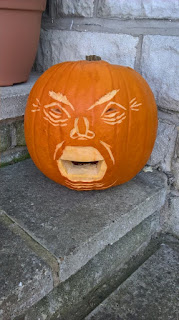 To be fair, the Diocese is aware that there is something of
an imbalance in the sorts of people who are training locally for the Divine
Ministry. Actually there is a whole set of imbalances, but the one that most
concerns us here is the great preponderance of candidates from evangelical
backgrounds of different sorts. Too monochromatic a flavour to the CofE is
deemed to be undesirable, so the ministry department has been gathering
together incumbents from various churches they inadequately but comprehensibly describe
as ‘central-plus’ to talk about the matter. I offered to host the first
meeting, mainly because I knew the bishop would be there and I was keen for him
to have an idea what Swanvale Halt parish was like. Il Rettore was there, all the way from Lamford. In fact there aren’t
that many outright ‘catholic’ parishes in communion with His Grace of
Guildford; probably about half a dozen, so, as I say, ‘central-plus’ isn’t that
bad a denominator to delineate a miscellaneous collection of catholic, ‘floral-and-choral’,
‘high’, and not-quite-evangelical churches.
To be fair, the Diocese is aware that there is something of
an imbalance in the sorts of people who are training locally for the Divine
Ministry. Actually there is a whole set of imbalances, but the one that most
concerns us here is the great preponderance of candidates from evangelical
backgrounds of different sorts. Too monochromatic a flavour to the CofE is
deemed to be undesirable, so the ministry department has been gathering
together incumbents from various churches they inadequately but comprehensibly describe
as ‘central-plus’ to talk about the matter. I offered to host the first
meeting, mainly because I knew the bishop would be there and I was keen for him
to have an idea what Swanvale Halt parish was like. Il Rettore was there, all the way from Lamford. In fact there aren’t
that many outright ‘catholic’ parishes in communion with His Grace of
Guildford; probably about half a dozen, so, as I say, ‘central-plus’ isn’t that
bad a denominator to delineate a miscellaneous collection of catholic, ‘floral-and-choral’,
‘high’, and not-quite-evangelical churches.
We chatted through a couple of meetings about what might be
wrong. My thinking is that, at the moment, catholic congregations tend to be
small and find it hard to develop the sense of excitement, involvement and
wellbeing that bubbles over the top of the pot in the form of people seeking to
explore a sense of vocation. It happens, of course, but not that often. Smaller
churches are likely to be finding it harder to keep the show on the road (not a
very Christian concept anyway), and so, on the whole, it feels less fun being a
Christian in them than in a big church throbbing with souls. I suggested that
if the diocese really wants to increase the number of catholic-minded ordinands
it needs to pick a couple of likely parishes and work on them in the long term,
put resources into them, send them curates even when they don’t qualify under
the existing rules and subsidise youth-and-families workers even when they don’t
have the money to pay for them, that sort of thing, and not expect to see much
return for ten years or more. Of course they won’t do that, because it’s too
complicated. The powers-that-be from the department talked instead about
publicity and vocations events, the stuff they know they can do without shaking
things up too much. It’s not just institutional inertia: they’re as overworked
as everyone else.
At our second meeting the incumbent of one of the more
prestigious churches in the diocese boldly told them they’d got all this the
wrong way round (he’s long since given up any thoughts of being a bishop so can
say what he likes). ‘We keep talking in terms of individual people’s vocations
to this and that’, he said, ‘when I’ve becoming increasingly aware of the
common nature of the enterprise. We discover our priesthood, if that’s what we’re
talking about, as the Body of Christ together, not as individuals on our own.’
He’s got together a group of people who he’s identified as likely characters,
not to fill any particular roles, but to think
about how the parish might assist its people in realising their own vocation as
members of the Body, meeting together regularly over the course of six months
or so running up to Easter. The group (‘I wrote to 14 people but we’ve ended up
with 12, coincidentally’) hasn’t got much of an agenda as such, and isn’t
aiming at identifying people to send up into the diocesan system of
vocations-discernment (though that might happen), but about affecting the way
the congregation thinks.
It all sounds a bit vague, but I rather like it. It isn’t actually
linked to any particular kind of church identity at all, but sounds like the
sort of low-key, discursive and open-ended venture that could work well for the
sort of people who find themselves in smaller, non-evangelical churches, and at
least has more roots in the life of the Church than roadshows and mailshots. We
have other fish to fry at Swanvale Halt at the moment – many, many others – but
it will be worth remembering.
(And anything will be an improvement on the truly shuddersome images you can discover, mainly emanating from our Roman brethren, by merely asking Dr Google to search the word 'vocations' for you.)













